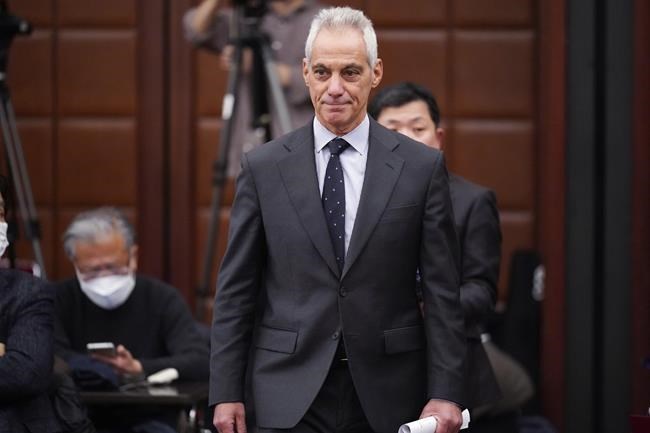
U.S. Ambassador to Japan Rahm Emanuel is escorted to the venue to attend a news conference at the Japan National Press Club Wednesday, Feb. 15, 2023, in Tokyo. Emanuel said the Chinese balloon's intrusion into U.S airspace was not an isolated incident, but part of a pattern of behavior and actions. (AP Photo/Eugene Hoshiko)
Republished February 15, 2023 - 5:27 PM
Original Publication Date February 15, 2023 - 6:31 AM
TOKYO (AP) — U.S. Ambassador to Japan Rahm Emanuel said Wednesday he has “full confidence” that the Japanese government will take the necessary steps to ban discrimination against LGBTQ people.
LGBTQ people have been campaigning for the government to adopt an anti-discrimination law after an aide to Prime Minister Fumio Kishida told reporters he wouldn’t want to live next to LGBTQ people and that citizens would flee Japan if same-sex marriages were allowed. Kishida quickly fired Masayoshi Arai, the aide.
Activists are urging the government to enact anti-discrimination legislation before Japan hosts a summit of the Group of Seven industrialized nations in May in Hiroshima. Japan is the only G-7 member that has not recognized same-sex marriage or enacted an anti-discrimination law for LGBTQ people.
“I have full confidence based on the swiftness of the prime minister's actions," Emanuel said at a news conference.
Japan's parliament "will reflect not only the will of the Japanese public, but take the steps necessary to be a clear unambiguous voice not only for tolerance, but against discrimination,” he said.
Support for sexual diversity has grown slowly in Japan and legal protections are still lacking for lesbian, gay, bisexual and transgender people, who often face discrimination at school, work and at home, causing many to hide their sexual identities.
Campaigns for equal rights for LGBTQ people have faced persistent and strong resistance from conservatives in Kishida’s governing Liberal Democratic Party. An attempt to enact an equality awareness promotion law ahead of the 2021 Tokyo Olympics was quashed by the party.
Meanwhile, more than 200 local municipalities, including Tokyo, have introduced partnership certificates for same-sex couples, allowing them to rent apartments and sign documents in medical emergencies and for inheritance. But the certificates are not legally binding and same-sex couples are often barred from visiting each other in the hospital and from accessing other services available to married couples.
Media surveys show public support for legalization of same-sex marriage has increased in recent years to more than 60%.
At a recent rally, more than 30 LGBTQ and other rights groups adopted an appeal to Kishida and heads of both houses of Parliament to enact an anti-discrimination law — not the awareness promotion legislation currently being considered by the governing party.
Recent equivocal comments by Kishida were seen as indicating his reluctance to promote equal rights for LGBTQ people despite a previous pledge to create an inclusive and diverse society.
Responding to a lawmaker’s question in Parliament, Kishida said whether to allow same-sex marriage is “an issue that must be examined extremely carefully.” A decision requires a thorough examination of all of society “because the issue may change the concept of family and values as well as society,” he said.
Japan signed a G-7 summit communique in June that called for “full, equal and meaningful participation of women and girls in all their diversity as well as LGBTIQ+ persons in politics, economics, education and all other spheres of society.” Activists say Japan should keep that international pledge.
News from © The Associated Press, 2023